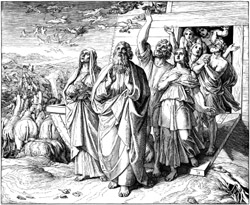As for Me and My House
The Family in the Purposes of God

In Islamabad recently, a university lecturer spoke on the factors that make a country or culture prone to progress or poverty. He said “I am not here to tell you how to succeed, because it is not important that you succeed by yourself. What is important is that your families and communities… are healthy and strong and have all their needs met. What I am telling you today is not just for you but for your whole family.” The students began to clap, slowly at first, then rising steadily to a standing ovation. The head of the department later said, “I have never seen the students even clap for a speaker before, much less clap like that! What you said has touched our hearts.”
The family is the most widespread and enduring structure of human society. Everywhere people have families, some fairly healthy, some disastrous—the greatest source of joy for some and the greatest source of pain for others. Almost always they are a mixture of the two. The Chinese say “Five generations under one roof, heaven on earth.” But how many people think like that anymore? Some might even say it’s “hell on earth.”
The Bible is our greatest source of revelation, but we often look only at one piece, a passage here or there, missing the forest for the trees. We cannot do the will of the Father without understanding what that will is. To fulfill the covenant God made with His people, we must seek to understand better what the covenant is—a covenant made with families and for families. The Bible is a history of God choosing godly families to carry out His purposes on our planet.
How God’s Kingdom Was to Be Established on Earth
In Genesis 1 we see that God created Adam and Eve so that, through relationship with Him and on His behalf, they and their descendants would become the godly caretakers of all life on earth. God’s kingdom, or reign, over the earth was to be exercised through Adam’s family.
Satan launched an immediate assault on God’s plan (Genesis 3), attacking man’s relationship with God, and then attacking Adam’s family. Life is war, and the family is the epicenter of that war! Satan continually wars against God and His purposes, seeking to curse and destroy all the families of the earth—including yours, mine, and those around us.
In Genesis 6 and 7, as the living things on earth became increasingly violent, God decided to destroy mankind and all air-breathing creatures from the earth. To accomplish this, God called and rescued one godly family to carry on His plan. In Genesis 8:18-19, not only Noah’s family came safely out of the ark, but “every beast, every creeping thing, and every bird, everything that moves upon the face of the earth, went out by families from the ark.”
Then God made Noah’s family a promise that He would never again destroy mankind and the animals, repeating again the command He gave to Adam to be fruitful and multiply and spread his family over the earth to rule it as God’s caretakers.
Don’t miss the fact that God had not changed His original plan to use a godly family to establish his dominion, or His kingdom, on the earth. In spite of his best efforts, Satan had not succeeded in deterring God from His original plan.
As the story unfolds, we see God keeping track of all the families of the earth. Even after the tower of Babel, God keeps track by name of heads of households, and they are listed according to “their clans and languages, in their territories and nations” (Genesis 10:20, NIV). Does God still know the names of all the heads of households on our planet and the territories where they live? We suggest He does.
In Genesis 12, God made a special covenant with Abram and his whole family. After retracing the family of Noah to the birth of Abram, Genesis 12:3 records that God says to Abram, “I will bless those who bless you … and in you all the families of the earth shall be blessed.”
So, who did God choose to bring His blessing to the world? Not an agency, not an organization, but a family. And who did God say would receive this blessing? Not individuals, not countries or even languages but families—all the other families listed in Genesis 10 and 11—all the families of the earth.
So the family structure is the bearer of God’s blessing, and also the receiver of God’s blessing. God blesses families who are willing to be obedient to Him, and He expects us as families to fulfill the promise He made to Abraham by blessing the other families of the earth. God’s covenant with families is also a commission—to extend that blessing to other families.
The Family is the Basic Social Unit of God’s Redemptive and Rulership Purposes in the World.
The Family is also the Receptor Unit of God’s Redemption and Rule!
But what does God mean by “families”? God was not referring to just Abraham, his wife and son. When Abram left “as God had told him,” he took with him his entire household—all those for whom he was responsible, including his orphaned nephew. In Egypt, he added to his household many more people as servants. It was such a large group that when they returned from Egypt, Abram had to split from Lot to have enough pasture land for all their flocks. Later, when Abram rescued Lot, he brought more than 300 fighting men from his own household. There were almost certainly 1,000 people in Abram’s household.
Was this huge household included in God’s covenant and blessing? When God marked His covenant with Abraham, all the males in his vast household were circumcised. Genesis 17:15-21 says that God’s blessing would rest on Ishmael and his descendants, even though His everlasting covenant with Abraham would be through Isaac. Though the covenant promise (to bless all the families of the earth) was passed down through some, God’s blessing was on the whole household.
We can use the biblical term oikos to mean this whole household, which is essentially a community with a family at its core. When committed spiritual, economic, and social relationships develop around an extended family, all these people together constitute the oikos. In the Bible we see that the family household or oikos is the basic building block of God’s kingdom on earth.
God’s calling on Abraham’s family was not only wide, including all of his household in that generation, it was also long. The covenant was repeated to successive generations—to Abraham’s son Isaac and his grandson Jacob. In Genesis 28:14, God says to Jacob “in you and your offspring shall all the families of the earth be blessed.… I am with you and will keep you wherever you go … for I will not leave you until I have done what I have promised you.”
Does this “I am with you wherever you may go” promise sound familiar? It should, because Jesus reiterated it when He told his disciples to complete the commission that God had given to Abraham. Jesus extends to us the covenant God made with Abraham. “It is those of faith who are the sons of Abraham. And the Scripture, foreseeing that God would justify the Gentiles by faith, preached the gospel beforehand to Abraham, ‘In you shall all the nations be blessed.’ So then those who are of faith are blessed with Abraham.... If you are Christ’s, then you are Abraham’s offspring, heirs according to promise” (Galatians 3:7-9, 29).
So what has God promised us as Abraham’s descendants? He has promised that all families on earth will be blessed through us. We can confidently spread the blessing of the gospel to all families because God has already promised He will do that through us.
How the Apostles Spread Abraham’s Blessing
For many years we have been studying the way the gospel is shared in the book of Acts. However, only recently did we notice that in Acts the apostles consistently preach the gospel as God’s fulfillment of His promise to the whole family, community or people group. They never say, “Jesus came to save you” (singular); it is always about all of them.

For example, at Pentecost, when Peter preached to Jews from many countries, he pointed out that “the promise is for you and for your children and for all who are far off—everyone whom the Lord our God calls to himself” (Acts 2:39). This is a family message, an “ends of the earth” message. This good news is a message of God’s blessing coming to your whole family, or oikos, wherever they are on the planet.
In Acts, the Good News for the Jews was that Jesus came to fulfill the promises of God to bring salvation to all the descendants of Israel. Peter said to the Jews in the temple, “You are sons of the prophets and of the covenant God made with your fathers.” He said to Abraham, “And in your offspring shall all the families of the earth be blessed’” (Acts 3:25). Here Peter was making clear that this good news was not only for their whole family, but through their family for all the other families on earth as well. God’s promise was both a covenant and a commission.
How do the apostles share this good news with Gentile families? The first time Peter preached to a Gentile household, he exclaimed to Cornelius’s relatives and friends: “I now realize how true it is that God does not show favoritism but accepts from every nation [every ethnic group or family line] the one who fears him and does what is right” (Acts 10:34-36, NIV). But as Peter continued, he said, “God sent [this message] to the people of Israel.” Before he had even finished this qualifier, the Holy Spirit fell on Cornelius’s oikos (household), completely surprising Peter and the Jews with him. Perhaps they thought God would only accept this Gentile family when they became Jews; Peter was still preaching the gospel as a message from God to the Jewish people group. They were just beginning to comprehend that a Gentile family could also receive the blessing of Abraham and become his spiritual descendants through faith alone.
Soon the apostles began to understand that this message of the blessing of God, this restoration of our relationship with God through Christ, is a blessing for all the families of the earth, not just the Jews. When speaking to Gentiles, the apostles did not turn the message into one of individual salvation. The apostles continued to preach salvation to the whole people group or whole family.
So when Paul preached in Athens (Acts 17), he emphasized several things: we all come from one man, God made every family line or people group and knows when and where they live, and we are all God’s offspring (quoting one of their own poets). Paul understood and made clear that this message is for all families everywhere; God is calling all people groups everywhere to repent of their ignorance.
To our embarrassment, we cannot remember ever presenting the gospel in this way. We have shared the gospel with whole families before, but we have not said, “This is a message of blessing and hope and reconciliation for your whole extended family. God has done something amazing through Jesus Christ that will bring a blessing to your whole family and to your whole people group. All of you can be saved!”
How could we have overlooked this key aspect of the way the gospel message is presented in the New Testament?
We Have Failed to Bring the Gospel Blessing to Families

We must acknowledge that in recent centuries, Protestant missionaries have not always brought the gospel as a blessing to families of the earth. Rather, our well-intentioned zeal to tell individuals about Christ and call them to commitment has often resulted in tearing families apart. We need to re-think all our strategies and missiologies in terms of the covenant God made with Abraham and take a new “Hippocratic” oath: First, do no harm … to families.
Perhaps once we learn how to implant the gospel in families and peoples in such a way that they receive it as truly good news for them all, we will see the news of the Kingdom spread from family to family and peoples to peoples. “And this gospel of the kingdom will be proclaimed throughout the whole world as a testimony to all nations [families], and then the end will come” (Matthew 24:14).
Until we fully realize and appropriate what it means that our families become both recipients and bearers of God’s blessing, we cannot fully grasp what it looks like to carry this blessing to other whole families.
What Does That Mean for My Family?
We want to emphasize these two points:
Through your commitment to Jesus, God is blessing your whole family—your parents, your siblings and cousins, even your friends, and your children and grandchildren through endless generations.
The gospel message includes God’s intention to make this same blessing available to all families everywhere—to extended households, clans and people groups.
You may be thinking, “You don’t know my family. It’s a disaster. God could not possibly use us!” But God consistently chooses to work with families with significant problems—like Abraham and Sarah (who doubted God and fathered Ishmael), or Isaac (who picked up his dad’s fear and sin and lied again to Abimelech).
Not only does God take seriously his commitment to bless and use our families, God also takes seriously the commitments of heads of households to Him. Abraham made a decision on behalf of his whole household and all of his descendants. Just before Joshua died, he reviewed the whole history of the family of Abraham and the covenant that God had made with them. He challenged the families of the tribes of Israel to choose to follow God, making a declaration for his whole household, saying, “But as for me and my house, we will serve the Lord” (Joshua 24:14-22).
Similarly, when God was pleased with David’s commitment to Him, He announced that the Messiah would come from David’s descendants. God’s promise to David remained secure, even when David’s descendants turned away from God, did what was evil, and lost the right to rule.
The declarations and commitments that heads of households make have spiritual consequences—a binding effect beyond their immediate sphere of influence, both horizontally (with their current extended family), and vertically (on future generations).
In the New Testament, we see similar power of heads of households to say “as for me and my house.” You, too, can make decisions that are powerful for your household.
What if only a wife or other household member who is not in authority over the family becomes a believer? Does the blessing in that case extend to the whole family or not? Paul indicates that it does: “If any woman has a husband who is an unbeliever, and he consents to live with her, she should not divorce him. For the unbelieving husband is made holy because of his wife, and the unbelieving wife is made holy because of her husband. Otherwise your children would be unclean, but as it is, they are holy” (1 Corinthians 7:13-15). Paul does not mean that all are saved by the faith of one believer in the family (see verse 16), but he does say that they are now holy, sanctified or set apart for God in a special way. Because of the faith of the believing member of the family, a special blessing has come on them all.
Households that come into a covenantal relationship with God through these types of decisions become partakers of God’s blessing to the families of the earth. They become part of the family of God through adoption by the Spirit, and part of Abraham’s descendants and his covenant. So what does this mean? It means that a believer’s family is actually part of Abraham’s family that is bringing the fulfillment of God’s promise to other families of the earth. It means that God is going with you, just as Jesus said: “Go therefore and make disciples of all nations.... And behold, I am with you always, to the end of the age” (Matthew 28:20).
What about single people? While they may not have married into a family, they still come from a family that God will bless because of their faith. And God is faithful to bless others through single people as well. Joseph, in spite of being treated very poorly by his own family, remained faithful to the calling and character of God. Surely no patriarch brought God’s tangible blessing to more families, including his own, than Joseph.
Most of us have been taught that through Jesus, we are now adopted as individuals into a new family, the family of God. This is true (Galatians 4:4-5), and can be a special comfort for those from difficult families. However, it is also true that through our commitment to Christ, the blessing of God comes upon our own families, even those non-believers, as it did on the whole family of Abraham.
Do not underestimate the willingness and power of God to bless your whole family because of the commitment you have made to Him through Christ. “For the promise is for you and for your children and for all who are far off” (Acts 2:39). But remember, the point of that blessing is for your family to become a blessing to the families of the earth, just as Abraham took his whole household to a far-off place where God wanted to extend His blessing and His kingdom.
All Scripture references are from the English Standard Version except where noted as being from the New International Version (NIV).









comments